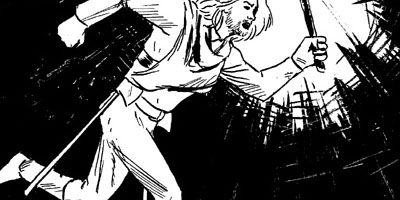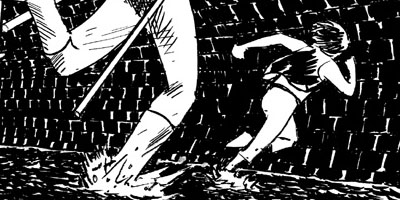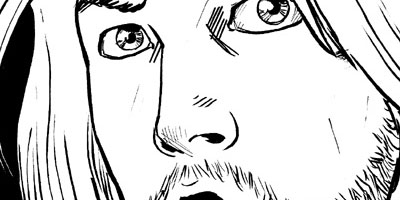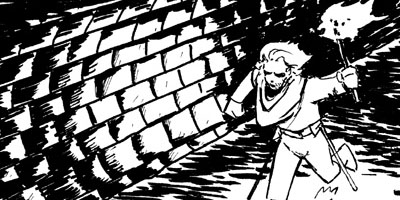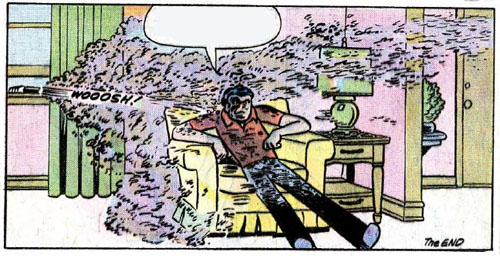
2
Oct
Improved Archie and the Dragon
Posted by MGK Published in Archie (Improved Or Otherwise), Comics, Interactive Fun Time Party
1
Oct
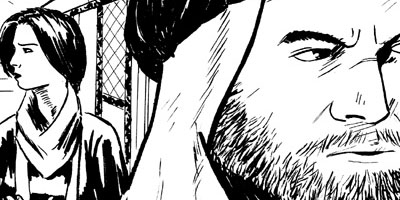
And if you like, you can also go to the dedicated Al’Rashad site.
22
Sep
Gets Judge Dredd mostly right – which is to say that as a consequence of getting it mostly right (e.g. brutally violent and extremely dark), this movie is definitely not going to be for everybody.
18
Sep
The Wise Man’s Improved Archie
Posted by MGK Published in Archie (Improved Or Otherwise), Comics, Interactive Fun Time Party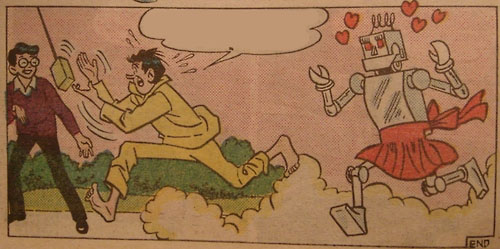
17
Sep
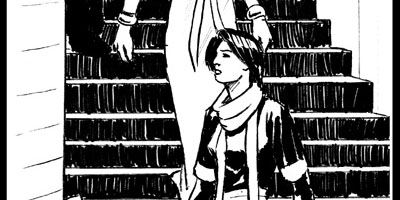
And if you like, you can also go to the dedicated Al’Rashad site.
14
Sep
Things I Love About Comics: Karl Kesel
Posted by John Seavey Published in Comics, General Nerd Crap, General Nerd Shit, You Should ReadIn this particular case, I think it’s probably “Things Everyone Loves About Comics: Karl Kesel”. Because really, who has bad things to say about Karl Kesel? He’s a phenomenally talented inker who’s been working in the indsutry for decades, alongside everyone from John Byrne to Rob Liefeld, and who has a gift for making everyone he works with look better. (If you’re thinking, “He sure didn’t make Rob Liefeld look good,” remember that I just said “better”. Industry legend has it that Rob turned in the pencils for the final issue of the ‘Hawk and Dove’ mini-series late, without and hands or feet drawn in for any of the characters, then took the metaphorical phone off the hook. Those hands and feet you see there? All the work of the inker, which means they may be the only correctly drawn feet in a Liefeld book ever.)
In addition to his art, he’s got a lot of great writing work under his belt. The 90s ‘Hawk and Dove’ series he did with his then-wife Barbara remains a cult favorite, with all sorts of the things I absolutely love about comics that we never get to see enough of. (They actually created new villains for the series! It had unironic humor! The heroes used their powers cleverly, and were sympathetic and likeable! There was a really strong supporting cast, and good love interests for each of the two leads, who despite being male and female didn’t spontaneously fall in love! …until after the series ended, but in the interests of staying relentlessly positive I will not touch ‘Armageddon 2001’ with a twenty-meter cattle prod.) (And neither should anyone else.)
He did a phenomenal, well-remembered run on ‘The Adventures of Superman’ that’s perhaps best known for introducing the new Superboy…who wasn’t always that emo, I swear! As with ‘Hawk and Dove’, his run was always characterized by well-written, funny dialogue and fast-paced adventure (which he carried over to his two excellent runs on ‘Superboy’. Probably my favorite moment in the history of the character was when Knockout tried to manipulate him into becoming a supervillain, finally trying to cement his corruption by telling him to kill another villain in an issue-ending cliffhanger…only to told, at the start of the next issue, “Are you nuts?”) He wrote ‘The Final Night’, which was a nice, tight, one-month crossover of the kind we saw for about four years from DC and then never again, which gave Hal Jordan a noble, dignified send-off that undid a lot of the poor treatment he’d suffered at the hands of DC’s editorial crew and probably should have stayed as the final end for the character. He also did some nice work for the probably-misconceived but still well-written Tangent line from DC (he was the one who did the Joker stories).
Over at Marvel, he had a tragically underappreciated Daredevil run (anyone remember the awesome story where Mister Hyde was framed for murder and Matt Murdock had to defend him? That was Karl Kesel.) He also wrote the first few issues of ‘Fantastic Four 2099’, the really high quality ones before the line utterly imploded because Marvel fired the line editor and all the talented writers walked in protest. (There is, somewhere, an alternate universe where Marvel kept Joey Cavalieri on, and Peter David and Warren Ellis and Karl Kesel kept writing their respective titles for another few years at least. I want to go there and steal all the comics.) He wrote an awesome FF annual where Ben Grimm traveled to a parallel universe where Marvel time mapped to real time one-to-one, and Johnny was in his late forties and thinking about retiring and leaving the whole “super hero” business to his kids. (High concept, and funny as hell.) He also wrote some great fill-in issues of the regular FF series, including the one where Ben Grimm was revealed to be Jewish (in what was ultimately a very touching Jack Kirby tribute. Another thing that Kesel loves to do is to tribute Kirby in ways both small and large. I approve.) I’m still hoping that someday he’ll get a regular gig writing the FF, because he has their voices down perfectly.
Oh, and he also did a really cute and clever “inverted X-Files” series called ‘Section Zero’ that was a victim of the implosion of the Gorilla Comics company, but that was way ahead of its time and presaged series like ‘The Middleman’ and ‘Warehouse 13′. It’s a frustrating theme of Kesel’s writing that all too often, he’s not considered to be a “hot” creator, and his work gets short shrift as a result. Either someone more famous comes along to write the book (like Kevin Smith on DD), or sales aren’t high enough to sustain a series. Which is a damn shame, because I’ve never read a Karl Kesel comic that hasn’t brought a huge smile to my face.
Oh, and if all that doesn’t convince you that he’s awesome, he just sold his whole comics collection. Why? To pay the medical bills of a special-needs baby he adopted. Even if he’d never written or drawn a single comic, that’d make him special. When you add it to everything else, it makes him one of comics’ unsung heroes…but I like to think that everyone who knows anything about him knows that he’s one of the great ones.
11
Sep
If I could find a way to see things straight I’d run away
Posted by MGK Published in Comics, I Should Write Dr. Strange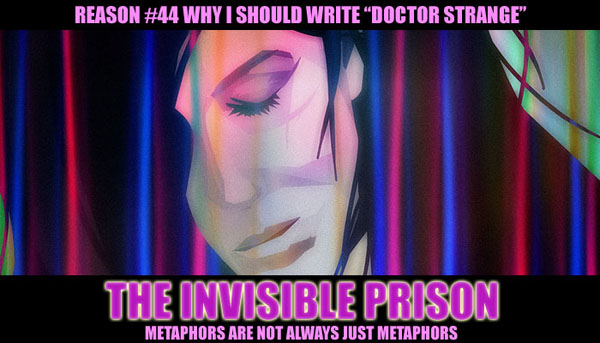
There’s an invisible prison, with invisible walls
Invisible cells and invisible bars.
On Wednesdays you’re allowed to exercise
Under invisible guards’ watchful eyes.
It’s not just a metaphor for mental illness, you see. Like most metaphors, it’s borne from something quite real. Unlike most metaphors, it’s not used in a way unconnected to the original use. The Invisible Prison is a very real thing: it captures one or two mages, sorcerers and wizards every year. Nobody knows who invented the bit of not-very-well-written doggerel that later became a skipping-rhyme (where, one figures, some smart kid grew up, became an expert on mental illness, and coined the phrase to better describe a very real societal problem with no connection to the rhyme’s origin). Nobody knows why it happens or how it happens. But they know it happens, and they know what happens to the people it captures. You see them on street corners, talking to themselves and begging for change. (Not all of them, of course. But a very few.)
Of course, lots of cut-rate supervillains have used the gambit since, because “make your enemy think he is crazy” is something every garden-variety sadist can come up with. But all of those supervillains miss the point. It doesn’t matter if you try to make Wolverine crazy because sooner or later he’ll pop his claws or realize his healing factor still works. It doesn’t matter if you try to make Captain America crazy because sooner or later reflex memory will kick in and he’ll do something he wouldn’t be able to do. You can’t convince a superhero that they’re delusional – at least, not enough for it to matter.
The invisible library has magazines
Which you read and you dream your invisible dreams
Of when you won’t sleep on your invisible cot
And will not get lost in invisible thoughts.
But you can convince a sorcerer of it. Because magic depends on will and belief – and if you doubt your ability to do magic, you won’t be able to do it. And if you take away their ability to do magic, then the underpinning of their world falls apart because you’ve destroyed the defining tenet by which they’ve organized their lives. It’s very effective and it hardly ever fails, which is why there are more than a few wandering, unstable homeless people who still, very occasionally, do magic by accident wandering the streets of New York City (where they are inevitably deposited by the Invisible Prison these days; it has done for centuries now, although before that it dropped people in London, Paris, Rome and Ur).
And, because we’re talking about magic, the Invisible Prison has advantages your standard villain-lair-designed-to-convince-the-hero-that-they-are-in-an-asylum does not. Because it’s not a physical place (although it can be). In many ways it’s more a state of mind. The Invisible Prison is wherever you are, and it takes a different form each time. It’s when you wake up in a hotel feeling the end of a three-day bender on which you never went. It’s going outside and feeling eyes on you from above, but when you look up they’re not there. It’s when you look in the mirror when you brush your teeth in the morning (because any mage worth their salt knows that dental hygiene is important) and you see bars in front of you – but only in the mirror. And sometimes, yes, it’s a dank cell in a dark pit, in the middle of a complex whose geography is odd and non-linear.
It is as subtle or as blunt as it needs to be, because the Warden (and there is a Warden) provides a tailored experience, whatever will destroy your mind most effectively, be it brutal, terrifying horror or creeping, steady paranoia. And there’s a relevant side-effect: once you’re in the Prison, you go “off the grid” for the purposes of divination magic. In the Prison, it is as if you never existed – until you leave it, a shell of what you once were. Nobody knows why it does what it does. Some think it’s a leftover tool of vengeance by a master mage who wanted to destroy a rival, and that that tool gained a sort of self-driving awareness. Others think it’s a conspiracy that tries to reduce the number of magic users in the world (and there are plenty of people who would like that to happen). But given its success rate, it really doesn’t matter.
One day you might stride out the invisible gate
After a lengthy invisible wait
But the invisible prison will not leave you whole
It tears at your mind and your heart and your soul.
Now, Dr. Strange isn’t going to get trapped in the Invisible Prison. Dr. Strange is the Sorcerer Supreme, after all, and you don’t get to that level without being able to deal with psychological warfare – even magically-assisted psychological warfare. The reason anybody knows the Invisible Prison exists in the first place is because a Sorcerer Supreme was the first (and only) person to break out of it in the mid-1400s. The Prison doesn’t go after Sorcerers Supreme. Maybe it’s because it only wants to grab people it knows it can break. Maybe it’s because it was scared off that one time. But in any event, Stephen Strange is quite safe from it.
But if a Sorcerer Supreme were to not live in isolation (as most do), and were to take apprentices (as most do not)… well, then the Prison might find itself a target that would allow it to strike back at the Sorcerer Supreme, albeit indirectly…
5
Sep
Democratic National Improved Archie
Posted by MGK Published in Archie (Improved Or Otherwise), Comics, Interactive Fun Time Party
4
Sep
In email zzzThunk says
First off, let me start by saying I like Al’Rashad. I enjoy it every week. But here’s what I don’t get: I know you’re capable of writing more sizzling dialogue than what makes it onto those pages. (It’s not bad dialogue at all, but…) You’ve shown us all that before, so I know it has to be a conscious choice. But why make that choice, exactly?
Because I’m trying to write something approaching more naturalistic dialogue rather than go with my usual hyper-stylized joke-spew? This isn’t to say I don’t enjoy writing like that. It’s fun to write like that, obviously. But putting it in the mouths of my characters rings false to me most of the time, so I don’t go that route. It just doesn’t seem right to me that these fantasy-epic characters should be talking like extras from a Joss Whedon script, you know? To say nothing of the fact that nobody would get their equivalent of pop-culture references.
Of course, there are character/world reasons for it as well. The astute will have noticed that everybody in this fantasy world, thus far, appears to mostly be speaking the same language, which is a bit odd given that the two dominant cultures (in terms of narrative thus far) are pretty wildly different from one another, and there are in-story reasons for that – involving a Roman Empire analogue that left behind their language as the lingua franca a couple of centuries ago. But if you look at some of the speeches, it’s clear that those individual cultures are reasserting themselves and their interpretations of that common tongue are starting to become individual dialects, and given another couple hundred years of cultural isolation from one another there would be enough language drift that they would be barely recognizable as kin. (It would actually happen much faster than that, actually, and I’m cheating a bit by having a lingua franca last as long as it has, but this is a creative choice because language barriers are mostly not fun.)
On top of that some of the characters aren’t particularly good choices for lengthy, witty interludes. Kahal is a very formal person for a number of reasons (after all, someone romancing a lady several miles above him on the social ladder should watch his words carefully). Rayana is an actual princess and also someone who has to watch her words carefully thanks to numerous political enemies. I mostly use Fezay and Joro for snark purposes because they’re both lower-class and proud (as is Tanquir, who also loves to hear himself talk, so there’s that – and yes, Tanquir is not finished yet in this story, rest assured).
But at the same time, I don’t want the dialogue in Al’Rashad to be too formal, or even, say, Conan-formal (and I have told myself repeatedly that if any page sounds like a page out of Conan, it needs a rewrite, unless it is too awesome to rewrite). I’m trying to hit that middle ground in a triangle where Conan is at one point, Whedon at a second and, say, David Mamet or even John Cassavetes at a third.
Anyway, the point of this post is basically “yes, the dialogue is supposed to be like that,” so you’re welcome, and I guess I’ll open the floor to other questions about the comic if people want.
23
Aug
Pretty sure I didn’t have a single friend, then I checked the mailbox
Posted by MGK Published in Comics, I Should Write Dr. Strange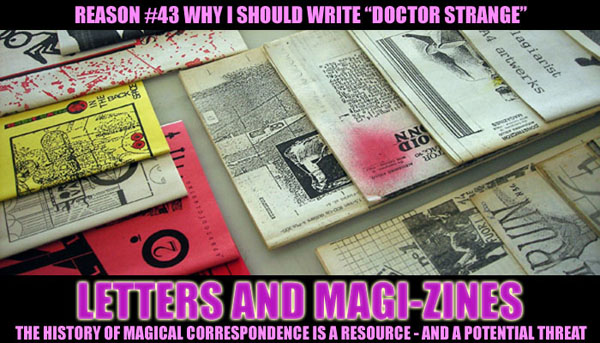
Most people think of magic instruction as being your basic master/student relationship (not least because so many people just think of it as being like how the Jedi do things in Star Wars), and sometimes this is, in fact, the case. Certainly it was the case for Stephen Strange’s introduction to magic, but what many people overlook is that the Ancient One was a fairly gregarious man as mages go in the first place (and quite possibly it is that ability to simply connect with and understand other people that makes for a good Sorcerer Supreme). Indeed, the one master/one student rule exists because most practitioners of magic simply don’t care for other people much, and if the system is to maintain itself then it shall maintain itself with the minimum stress to its users, and that is how it works.
This is not terribly surprising; after all, pursuing magic is in many ways a rejection of society as a whole. In the modern era it is a rejection of science; in the past it was a rejection of religion. Working magic almost always means defying not only societal norms but the things you have been raised and conditioned all your life to believe as true, to reject your own experience as true. Or, to put it more glibly: it is very hard to fire a magical zappy bolt when you have never fired a magical zappy bolt before, and it becomes harder when you have never seen anybody else fire a magical zappy bolt, and when they have never have never seen anybody fire a magical zappy bolt… it adds up. Which meant that many practitioners of magic had (and even today still have) to abandon society just to get anything done, and not coincidentally why the profession tends to be somewhat misanthropic at the best of times.
Still, magicians need to learn somewhere, and for years the only option was master/student in person, typically with the master demanding the student pay him a stipend or be a servant or what have you. This started changing in the mid-18th century as correspondence among the upper classes (who of course had most of the magic, as not having to work fourteen hours a day to avoid starving definitely gives one a leg up in studying magic) became more prevalent. Sir Humphrey Zzaxx-Clarkson, like many other mages of the era, began his career by sending a polite and very carefully worded letter to someone he (correctly) thought knew a few things. The polite response contained answers, and other names a promising young tyro could correspond with. And so the second age of magic instruction began – decentralized and somewhat impersonal, oftentimes limiting the students to basic tricks, and generally lending itself to any number of devastating flameouts (one thing at which master/student relationship excels is “keep student from blowing self up”), but on the whole was vastly more efficient at generating mages in greater quantities than previous years.
And this would have been fine, except for one thing: the extension of mass correspondence to the lower classes. This is not to say that the upper classes were deserving of magic, of course, but it is a simple human tendency that, when you generally have a good life, you’re more wary about risks – say, the inherent risk of binding a minor cacodemon to a candle so you have a permanent source of light, or something similar. Many of the minor aristocrats pursuing magic in the 18th and 19th centuries through correspondence would barely cast more than two or three spells a year. But when you’re the first person in your family to ever be able to read – you’ve usually got need for more than two or three spells a year.
Still, even though poor people now had the opportunity (mostly in America, of course) to learn magic through correspondence, it didn’t really explode until the late 1920s and the dawn of the pulp magazines. Magic enthusiasts followed Weird Tales and all the other fantasy, horror and weird pulps, and if there was only one truly enthusiastic student for every hundred people sending around their homemade fan magazines dedicated to Robert Howard or Lord Dunsany – that was enough, because those homemade magazines were like The Anarchist’s Cookbook on steroids and LSD all at once. The floodgates opened, and they never really closed from then on out, and it is not for nothing that in the Marvel Universe, this was when superpowers started emerging around this time in quantity. (Of course science was involved as well – but not all of the new powers emerging were scientific in their origin.)
This isn’t to say that all of the new superhumans emerging in 616 at this time were magic users; this isn’t even to say all those powers were caused by magic. But magic is fueled by belief and will, and when you suddenly have a lot more of all three sloshing around, there are knock-on effects. (Chupacacabras did not, in fact, exist until 1922, at which point they always had.) Magic is not predictable; loose, wild magic being powered by extraneous belief can do almost anything, and usually will.
Why does this matter to Dr. Strange in the present day? Well, it matters for three reasons. Firstly, it matters because quite frequently the answer to a magical dilemma can be found in correspondence between two sorcerers who have both been dead for over a century, which means negotiating with the people who now hold those letters. (Dr. Doom, unsurprisingly, has a large library of it.) Secondly, it matters because it’s still happening today via email and secured forum posting – and, yes, snailmail for the traditionalists – which means at any given point there are literally dozens of would-be wizards casting spells and unintentionally (one hopes) causing chaos that can be a tremendous bother when you are Sorcerer Supreme.
And thirdly, it means that someone clever enough and reckless enough will eventually realize that if he can make magical communication hit critical mass – by popularizing it, getting people to challenge themselves, ideally without them even knowing that they’re doing so – he can change the world itself forever, even if he’s not sure what result he’ll get. And preventing that is definitely part of the Sorcerer Supreme’s job, because one of the things you have to realize about magic is that by its very nature it can’t be for everybody, no matter how antidemocratic that may sound.
22
Aug
![VERONICA: [CLIFFHANGER reference] / ARCHIE: [VERTICAL LIMIT reference]](/images/archclimb.jpg)
Search
"[O]ne of the funniest bloggers on the planet... I only wish he updated more."
-- Popcrunch.com
"By MightyGodKing, we mean sexiest blog in western civilization."
-- Jenn
Contact
MGKontributors
The Big Board
MGKlassics

Blogroll
- ‘Aqoul
- 4th Letter
- Andrew Wheeler
- Balloon Juice
- Basic Instructions
- Blog@Newsarama
- Cat and Girl
- Chris Butcher
- Colby File
- Comics Should Be Good!
- Creekside
- Dave’s Long Box
- Dead Things On Sticks
- Digby
- Enjoy Every Sandwich
- Ezra Klein
- Fafblog
- Galloping Beaver
- Garth Turner
- House To Astonish
- Howling Curmudgeons
- James Berardinelli
- John Seavey
- Journalista
- Kash Mansori
- Ken Levine
- Kevin Church
- Kevin Drum
- Kung Fu Monkey
- Lawyers, Guns and Money
- Leonard Pierce
- Letterboxd – Christopher Bird - Letterboxd – Christopher Bird
- Little Dee
- Mark Kleiman
- Marmaduke Explained
- My Blahg
- Nobody Scores!
- Norman Wilner
- Nunc Scio
- Obsidian Wings
- Occasional Superheroine
- Pajiba!
- Paul Wells
- Penny Arcade
- Perry Bible Fellowship
- Plastikgyrl
- POGGE
- Progressive Ruin
- sayitwithpie
- scans_daily
- Scary-Go-Round
- Scott Tribe
- Tangible.ca
- The Big Picture
- The Bloggess
- The Comics Reporter
- The Cunning Realist
- The ISB
- The Non-Adventures of Wonderella
- The Savage Critics
- The Superest
- The X-Axis
- Torontoist.com
- Very Good Taste
- We The Robots
- XKCD
- Yirmumah!
Donate
Archives
- August 2023
- May 2022
- January 2022
- May 2021
- January 2021
- December 2020
- October 2020
- June 2020
- March 2020
- January 2020
- December 2019
- October 2019
- February 2019
- January 2019
- December 2018
- April 2018
- March 2018
- February 2018
- January 2018
- December 2017
- November 2017
- October 2017
- February 2017
- January 2017
- December 2016
- November 2016
- October 2016
- September 2016
- August 2016
- July 2016
- June 2016
- May 2016
- April 2016
- March 2016
- February 2016
- January 2016
- December 2015
- November 2015
- October 2015
- September 2015
- August 2015
- July 2015
- June 2015
- May 2015
- April 2015
- March 2015
- February 2015
- January 2015
- December 2014
- November 2014
- October 2014
- September 2014
- August 2014
- July 2014
- June 2014
- May 2014
- April 2014
- March 2014
- February 2014
- January 2014
- December 2013
- November 2013
- October 2013
- September 2013
- August 2013
- July 2013
- June 2013
- May 2013
- April 2013
- March 2013
- February 2013
- January 2013
- December 2012
- November 2012
- October 2012
- September 2012
- August 2012
- July 2012
- June 2012
- May 2012
- April 2012
- March 2012
- February 2012
- January 2012
- December 2011
- November 2011
- October 2011
- September 2011
- August 2011
- July 2011
- June 2011
- May 2011
- April 2011
- March 2011
- February 2011
- January 2011
- December 2010
- November 2010
- October 2010
- September 2010
- August 2010
- July 2010
- June 2010
- May 2010
- April 2010
- March 2010
- February 2010
- January 2010
- December 2009
- November 2009
- October 2009
- September 2009
- August 2009
- July 2009
- June 2009
- May 2009
- April 2009
- March 2009
- February 2009
- January 2009
- December 2008
- November 2008
- October 2008
- September 2008
- August 2008
- July 2008
- June 2008
- May 2008
- April 2008
- March 2008
- February 2008
- January 2008
- December 2007
- November 2007
- October 2007
- September 2007
- August 2007
- July 2007
- February 2007
Tweet Machine
- No Tweets Available
Recent Posts
- Server maintenance for https
- CALL FOR VOTES: the 2021 rec.sport.pro-wrestling Awards
- CALL FOR NOMINATIONS: The 2021 rec.sport.pro-wrestling Awards (the Theszies)
- The 2020 RSPW Awards – RESULTS
- CALL FOR VOTES: the 2020 Theszies (rec.sport.pro-wrestling Awards)
- CALL FOR NOMINATIONS: The 2020 Theszies (rec.sport.pro-wrestling awards)
- given today’s news
- If you can Schumacher it there you can Schumacher it anywhere
- The 2019 RSPW Awards – RESULTS
- CALL FOR VOTES – The 2019 RSPW Awards (The Theszies)
Recent Comments
- George Leonard in When Pogo Met Simple J. Malarkey
- Blob in How Jason Todd Went Wrong A Second Time
- Cindi Chesser in Thursday WHO'S WHO: The War Wheel
- Scott Hater in Bing, Bang, Bing, Fuck Off
- dan loz in Hey, remember how we talked a while a back about b…
- Sean in Server maintenance for https
- Ethan in CALL FOR VOTES: the 2021 rec.sport.pro-wrestling A…
- wyrmsine in ALIGNMENT CHART! Search Engines
- Jeff in CALL FOR VOTES: the 2021 rec.sport.pro-wrestling A…
- Greg in CALL FOR VOTES: the 2021 rec.sport.pro-wrestling A…
